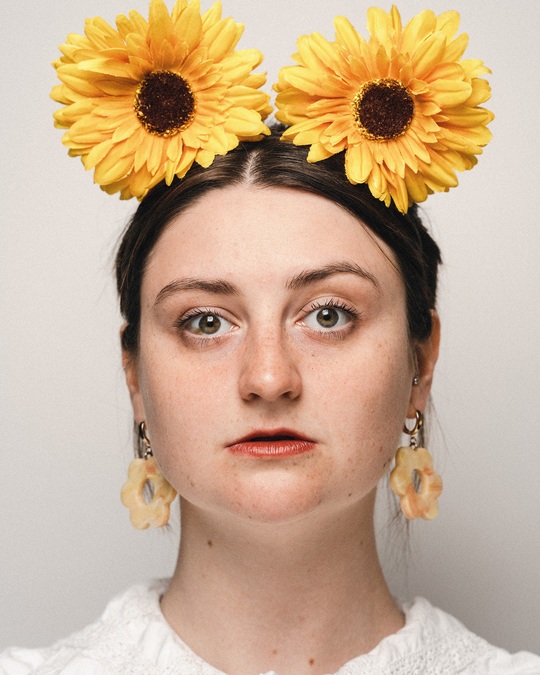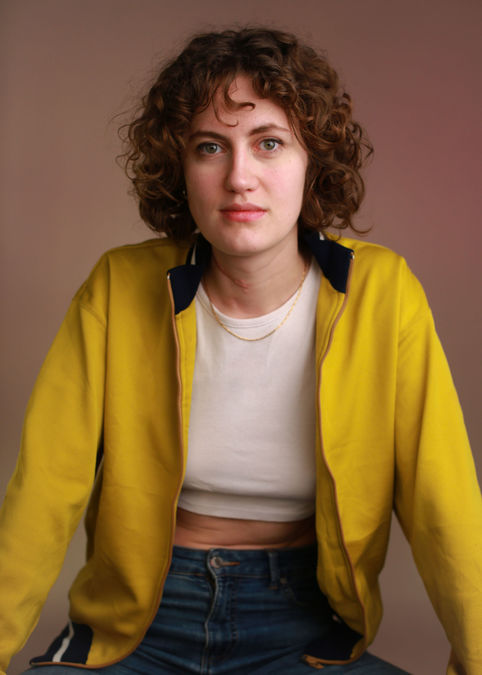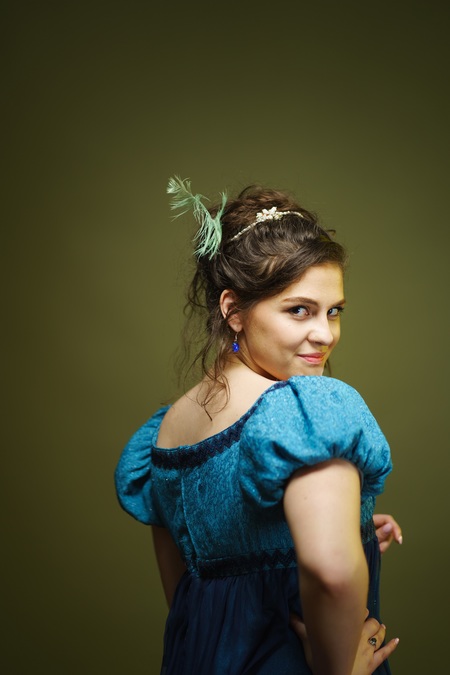Edinburgh Fringe 2023: Debuting character comics
We chat to three promising character comedians – Kathy Maniura, Rosalie Minnitt and Lorna Rose Treen – as they bring their first shows to the Edinburgh Fringe this August
“Today's been one of those days where I realised how soon Fringe is and had a bit of a wobble”, says Lorna Rose Treen. The rising star already has multiple plaudits to her name (Chortle Best Newcomer and two Funny Women Awards) and makes her debut at Fringe this year with her show Skin Pigeon (2-27 Aug, not 14, 4.35pm, Pleasance Courtyard). She’s one of a dozen character comedians taking their first shows to Edinburgh this August.
Rosalie Minnitt (Clementine, 3-27 Aug, not 14, 2.25pm, Underbelly Cowgate) is torn between excitement and apprehension ahead of her debut, her inner voice flitting between “Ah you’re gonna be fine, you’re gonna be amazing, you’re gonna be the talk of the town” and “this was a huge mistake and I wish I wasn’t doing it.”
Used to appearing as part of a duo, Kathy Maniura (Objectified, 2-28 Aug, not 14, 4.40pm, Gilded Balloon Teviot) is well aware that she needs supportive folk to rely on at the festival: “When it goes well you can celebrate it, and when it goes badly you can moan about it together. I think I'll have to be very deliberate about surrounding myself with people who I can do that with.”
Working up an hour of character comedy proves to be more difficult than your standard stand-up show. There’s often an unwillingness to book or accept the form at regular comedy clubs but one kind of space has been a haven for development. “Whenever I do queer shows, I feel like there's maybe more of an openness,” or acceptance of the alternative, says Maniura, thanks to drag and cabaret being firmly rooted in LGBTQ+ culture. She notes parallels between the queer scene and alternative performance too, a “shared sense that we're doing something a bit different and we sort of have to create our own spaces for it.” Having performed at university, Treen caught the bug again after signing up to a queer cabaret night and trying something a little more political. “I basically sexily danced to [Boris Johnson] masturbating about Big Ben – real high-brow stuff,” and the audience was “just so supportive and joyful.”
While queer spaces have meant that character comedy can be developed more freely, the form of comedy itself is freeing too. “You can get away with so much,” says Minnitt. “Like, if something doesn't work out you can be like 'well it's not a theatre show' and if a joke doesn't work people are like 'well that was pretty good lighting so it could be a theatre show.'” Maniura says it’s one of her favourite things about character comedy: “it blurs a lot of those lines in a great way... The scope of it creatively is really broad,” citing the comedy of acts like Natalie Palamides and Diane Chorley as poles apart in their style but united by presenting as someone else.
Treen is emphatic about character comedy, saying “I've always just really loved playing other people.” The style allows an outlet for her experience in clowning and improvisation. She trained at Gaulier (naturally) and did a stint as part of Edinburgh University’s The Improverts. “A lot of clowns will write flops into their shows where they do something that's deliberately a big risk and not funny so then they can come out from it again and save it. I try to write jokes that I think are good, which is also funnier when they flop, because then it's so embarrassing. I kind of think of my mistakes as gold sometimes. When things go wrong, that's where you have real special times, and audiences think, 'Wow, that was new and only just for me.'”
And although the presentness of live performance might make audiences fear being picked on, they don’t have to worry attending these shows. The most Maniura does is have a quick chat and let the room decide on the order of her show, snapping out of her characters and addressing the audience as herself. “What I've found is that people who aren't especially used to watching character comedy or absurd comedy find it comforting, me being me in-between.”
Comfort crosses Treen’s mind too, making sure any of her interactions are “delicate” and “polite”. “I know some clowning stuff can be really invasive. I want audience members to feel safe and like they're gonna have loads of fun.”
“I wanted to make something that didn't try to do anything more than just being funny,” Minnitt says. In the show, her character’s kin are played by Sylvanian Families, which, like real families, have caused her some grief. Replenishing her stocks after several shows, she scoured eBay for more figurines and “accidentally sent them to my ex-boyfriend's grandparents' house.” She unsurprisingly never heard back: “I need to know that my naked Sylvanians went somewhere and I've never had closure on it. I don't know where they are but I hope they're safe. I hope they have a good life.”
With an equally offbeat selling point, all of Maniura’s characters are objects. ”I started writing human characters, as I believe is probably normal, weirdly, and this is genuinely how it happened, then I did a few animals,” before finally settling on objects. “The secret is,” she says in hushed tones, “it's still really about people,” specifically the people the comic finds funny, annoying or fascinating.
When our chat turns to the wider state of the Fringe, our acts have similar thoughts on the potential of a festival without the ubiquitous Comedy Awards. Maniura believes the whole thing stinks, calling the situation this year “unambiguously shitty... I'm locked in so early as a performer,” she says, “it feels like I'm paying for all this stuff but nobody is making good on what they should be giving me. They can change their mind at any point, but I'm not allowed to. If I pull out now then I've lost a ton. It feels like a really unbalanced exchange.”
“People get so fixated on it”, agrees Minitt. “Although it can be so transformational to get that recognition, I think that the stakes are, at this point, so unbelievably unfair, that it's really hard for talent to out.” And despite the benefits award nominations can bring, the three suggest a lack of awards might alleviate some pressures felt by performers, particularly by allowing more creative risk-taking. It’s an attitude Treen thinks performers should apply to every Fringe, not just their first. “I don't need to wait until I'm perfect, and there's no such thing as being perfect in comedy or in anything. I've had friends who didn't debut for like six years or something, and then debuted, didn't get nominated, and it crushed them.” The comic leaves acts with some very sage advice: “someone said to me 'your first show is always going to be your worst show' and that really took some pressure off me,” Treen laughs.
... and a few more
Alongside our featured three, plenty of other character comics are embarking on their first Fringe. First up is Dominique Salerno with The Box Show (2-27 Aug (not 16), 3pm, Pleasance Courtyard), where over 25 characters are confined (and performed) in a 3ft x 3ft x 2ft cupboard.
Get Blessed (2-27 Aug (not 14), 1pm, Gilded Balloon Patter Hoose) is award-winning Irish writer-performer Niamh Denyer’s attempt to train up her willing audiences as funeral celebrants, addressing modern spiritual ideas and hustle culture as she goes.
Lachlan Werner (Voices of Evil, 2-27 Aug (not 15, 23), 10.30pm, Pleasance Courtyard) is a witchy whirlwind by way of puppetry in this camp, cartoonish horror send-up. And, after a fab run at Glasgow Comedy Festival this spring, Edinburgh-born Charlie Vero-Martin (Picnic, 3-27 Aug (not 14), 6.55pm, Underbelly Cowgate) entertains with her blend of surreal, joyful stand-up, characters and puppets.
Finally, though not straight-up character comedy, Kirsty Mann (Skeletons, 2-27 Aug (not 15), 5.50pm, Pleasance Courtyard) transforms into several characters in the tale of her secret life as a doctor.


